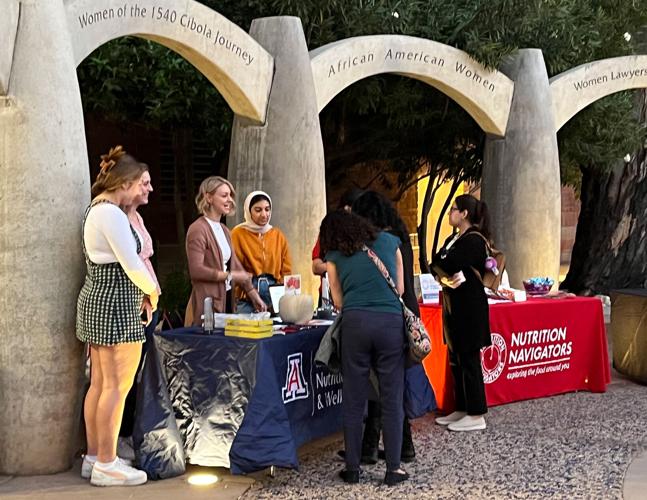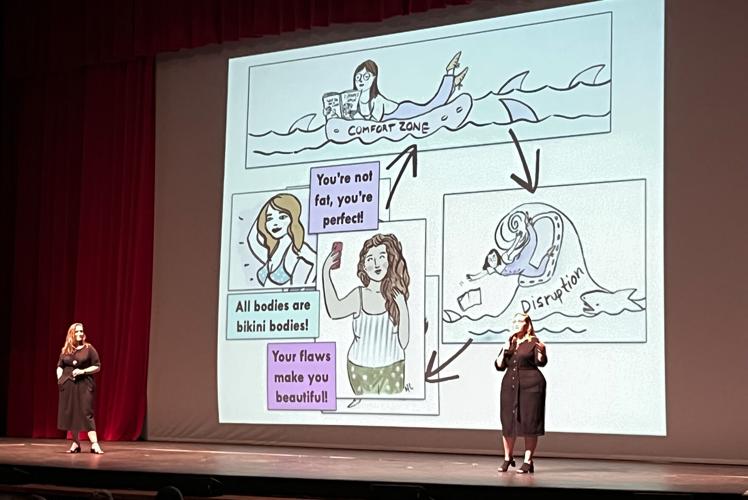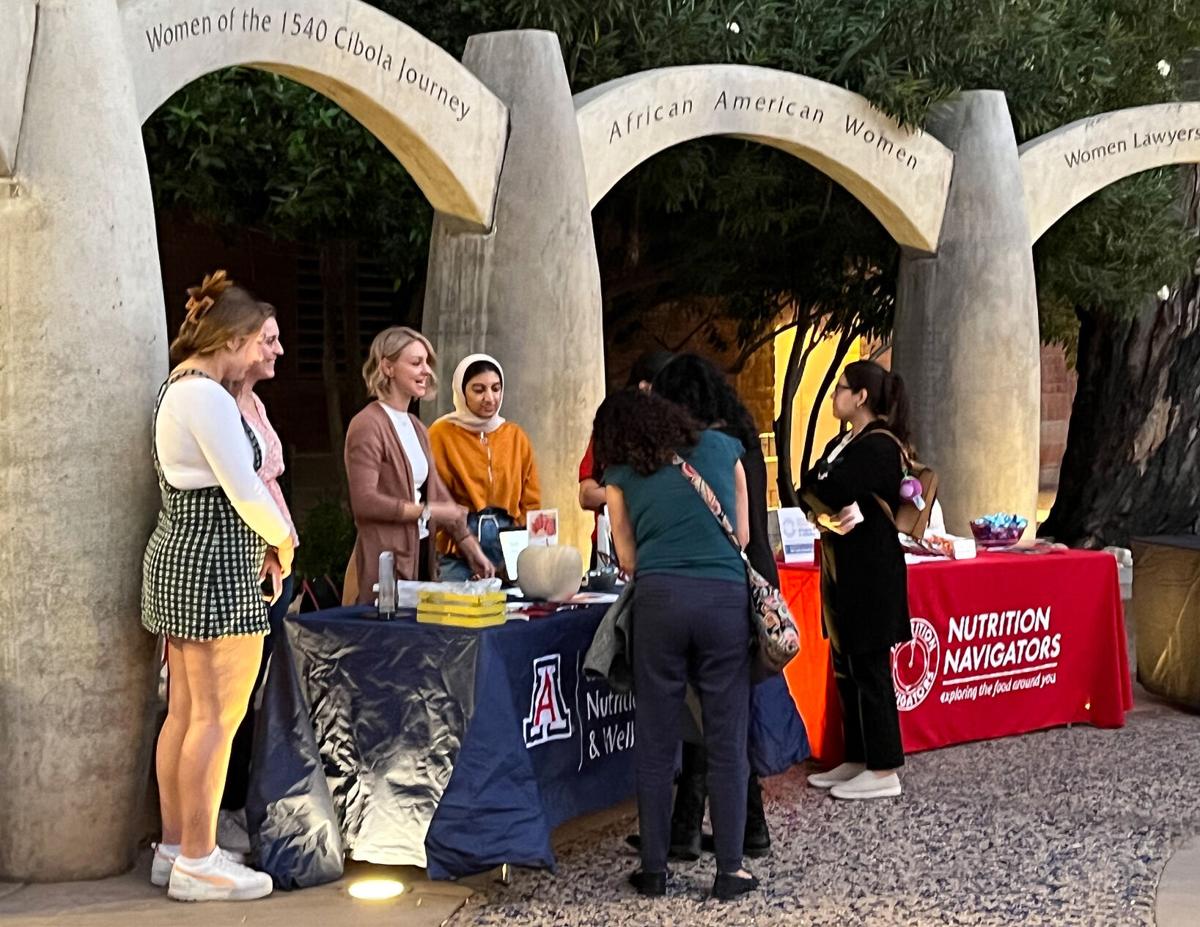There was no shortage of entertainment options for University of Arizona students on a recent Tuesday night, but nearly 800 of them piled into Centennial Hall to listen to a pair of experts talk about body image resiliency.
Over the course of an hour, authors, researchers and identical twins Lexie and Lindsay Kite walked attendees through the steps of dismantling self-objectification — when a person views themselves as a physical object first and a human being second — and developing a positive body image that focuses on more than appearance.
The audience was mostly women, with much of the Greek alphabet proudly displayed on sweatshirts, backpacks and water bottles, but several groups of men could be spotted in the auditorium.

The Kites’ campus presentation is one of several efforts by UA students and faculty to encourage people to praise their bodies for what they can do rather than how they look, and to think of health in broader terms than a number on a scale. With events, research projects and the offering of a new academic program students can minor in, campus leaders are hoping to educate students and community members and create an environment where everyone believes they and their body belong.
Pressure, especially on young women
The Kite sisters’ campus talk was hosted by the UA’s Pi Beta Phi sorority, after McKinley Severson, its vice president of community relations, saw Lindsay Kite in a TED Talk last semester.
“It was a course surrounding weight stigma and how has health been skewed around focusing on weight defining what health is,” Severson said. “Their talk spoke about just how young a lot of this pressure can come onto individuals, especially young women.”
Severson said she related to their message and that body positivity hadn’t been addressed by recent speakers on campus. She took the idea to her chapter and it was well received.
“We’ve all had our own experiences with the issue and don’t feel like it’s discussed enough,” Severson said.
Chapter president Sidney Haigler said that while there’s plenty of messaging about campus safety from physical dangers, there’s not as much talk about other types of harm.
“Having a negative body image is just as dangerous, maybe just more of a personal danger,” she said.
The chapter partnered with campus health and campus recreation to put on and promote the event, arranging for a small on-site resource fair with representatives from the UA’s Counseling and Psych Services, the Nutritional Sciences and Wellness program, the International Association Of Eating Disorders Professionals Foundation and more.
“A lot of times, in Greek Life especially, there are a lot of stereotypes or stigmas about what you look like,” Haigler said. “We want to push the message that that’s not the end all and be all of what gets you into a sorority. We love all body types.”
While Severson thought her peers would be interested in the Kite sisters’ message, she was shocked by the large turnout at the event, although she noted, “Even if their message doesn’t apply directly to them, most people can probably find someone in their life that struggles like that.”
Lexie and Lindsay Kite told students that today’s beauty-obsessed society perpetuates the false belief that health, happiness and the ability to be loved are tied to how a person looks. They described an action plan for attendees to change the way they think about themselves, and provided tools to help them move beyond the harm of self-objectification.
“You can be powerful, not in spite of what you’ve been through, not in spite of the disruptions you’ve faced and will continue to face, but because of them,” Lexie Kite told the crowd. “By naming your pain and by helping other people to be compassionate, by helping other people know they’re not alone, by being vulnerable and opening up, you can be more. That is the nature of resilience.”
They provided tips to increase what is now known as body image resilience, including being critical of media messages and facing feelings about body shame or embarrassment in order to spur personal growth and empowerment.
“Eight-hundred people got exposed to hearing their message. That can create so much positive change,” Severson said. “I’m excited and hopeful for the future of body positivity on our campus and the future of women and how our bodies will be viewed in society.”

Almost 800 students attended the body image residency event at Centennial Hall on the U of A campus.
‘Body neutrality’ is a goal
Words matter, especially when talking about a person’s body, and there’s a big difference between body positivity and newer schools of thought, including body image resilience, body neutrality and body appreciation.
UA professor Jennifer Stevens Aubrey has been working for years to understand body image and all the factors that affect how people view themselves. In 2019, Aubrey published a study in the Journal of Children and Media examining selfie behavior in adolescent girls and when it becomes concerning.
“The act (of taking selfies) alone was neutral,” Aubrey said. “But if they were preoccupied or invested in and engaging in editing tools and technology, those both increased self-objectification.”
Aubrey said the research is clear that self-objectification is not good for girls. “It’s not good for people in general, but especially not good for girls.”
She said it’s important that people focus on complimenting girls on things other than their looks, an approach that Aubrey called body neutrality.
“Body positivity can be kind of problematic from the research perspective. When you’re telling women to love their bodies ... the unintended consequence is that you’re telling them value is placed on their appearance,” she said. “Body neutrality seems to have more positive potential, because it would really retrain girls to not think about their externally perceivable appearance, but rather their body’s functionality.”
Aubrey is also encouraged by the idea of body appreciation, which includes ideas about respecting, loving, honoring and displaying gratitude towards one’s body.
“You can appreciate your body not just for what it looks like, but for what it can do for you,” she said.
There has been some unpublished research into body appreciation, she said. Researchers looked at a sample of women ages 18 through 29 and the types of people they followed on social media platforms to see if that has any effect on body appreciation.
White, Black and Asian American women who followed profiles with similar racial backgrounds to theirs experienced positive effects on body appreciation.
“Being around other women who all can achieve the same standards and ideals seems to promote the appreciation of valuing one’s body over appearance,” Aubrey said.
She’s getting ready to launch her own study in the spring to see if different types of messaging have an effect on self-objectification. Two studies have been done on the topic but they didn’t include messaging about body neutrality, which she believes will decrease self-objectification by participants.
Aubrey said that while body positivity is more easily understood and marketed, she’s hopeful the idea of body neutrality will become more mainstream.
“There are enough people in the know that are steering the conversation,” she said. “It makes me feel optimistic.”
Authors, researchers and identical twins Lexi and Lindsay Kite spoke to UA students about dismantling self-objectification and developing a positive body image that focuses on more than appearance. Video by Caitlin Schmidt / Arizona Daily Star.
New academic course offerings
These new ways of thinking have already reached administrators at the UA, who are putting the final touches on a new minor and certification program that focuses on weight inclusive health programs.
The program is open to anyone on campus who will be working with people, said Ashley Munro, who works as a nutrition counselor with Campus Health and is an adjunct professor. She said it’s especially useful for people in “helping professions,” including those who work in medicine, social work, teaching, psychology, social work and more.
“It’s really exciting to serve across the disciplines of what people want to do with their career,” Munro said. “We have hopes and dreams (to expand the program), but we have to see how things go.”
The certificate program is 12 units and the minor is 18. Students take the same core classes for both, which will include courses in intuitive eating approaches to health and wellness; weight stigma, nutrition and health; and body positive concepts. Munro and others have designed electives for the program, but other departments have also found courses that fit into the framework and can be used as electives for credit, she said.
“Intuitive eating is a very fun doorway to health at every size and learning about weight bias and body liberation,” Munro said. Intuitive eating encourages people to make food choices that feel good to them, without self-judging or being influenced by diet culture.
The body positivity course is an extension of a one-unit class Munro designed for her graduate school project. There are also six new courses.
The program has been in the works since 2020, when Munro and her colleagues started writing proposals for the university. With on-campus promotion and outside marketing, the minor and certificate program will soon be offered in full.
One of the courses, weight stigma, nutrition and health, was offered for the first time in the fall semester. With 53 students enrolled, Munro said it’s going well. She hopes at least one more core course and one of the new electives will be ready for enrollment in the spring.
“They’re all online, so it’s super accessible and can cross all campuses,” Munro said. “We’re getting all the online spaces ready to go so that once we have approval, we can just plug and play.”
Weight inclusive health isn’t something Munro got much exposure to during her undergraduate education, so she’s looking forward to introducing it to a new group of students each semester.
“To see students respond and work through the curriculum is really exciting,” she said. “They bring such different lived experience and perspective to the curriculum. The diversity in who we’re teaching will diversify what every student gets out of the program.”







